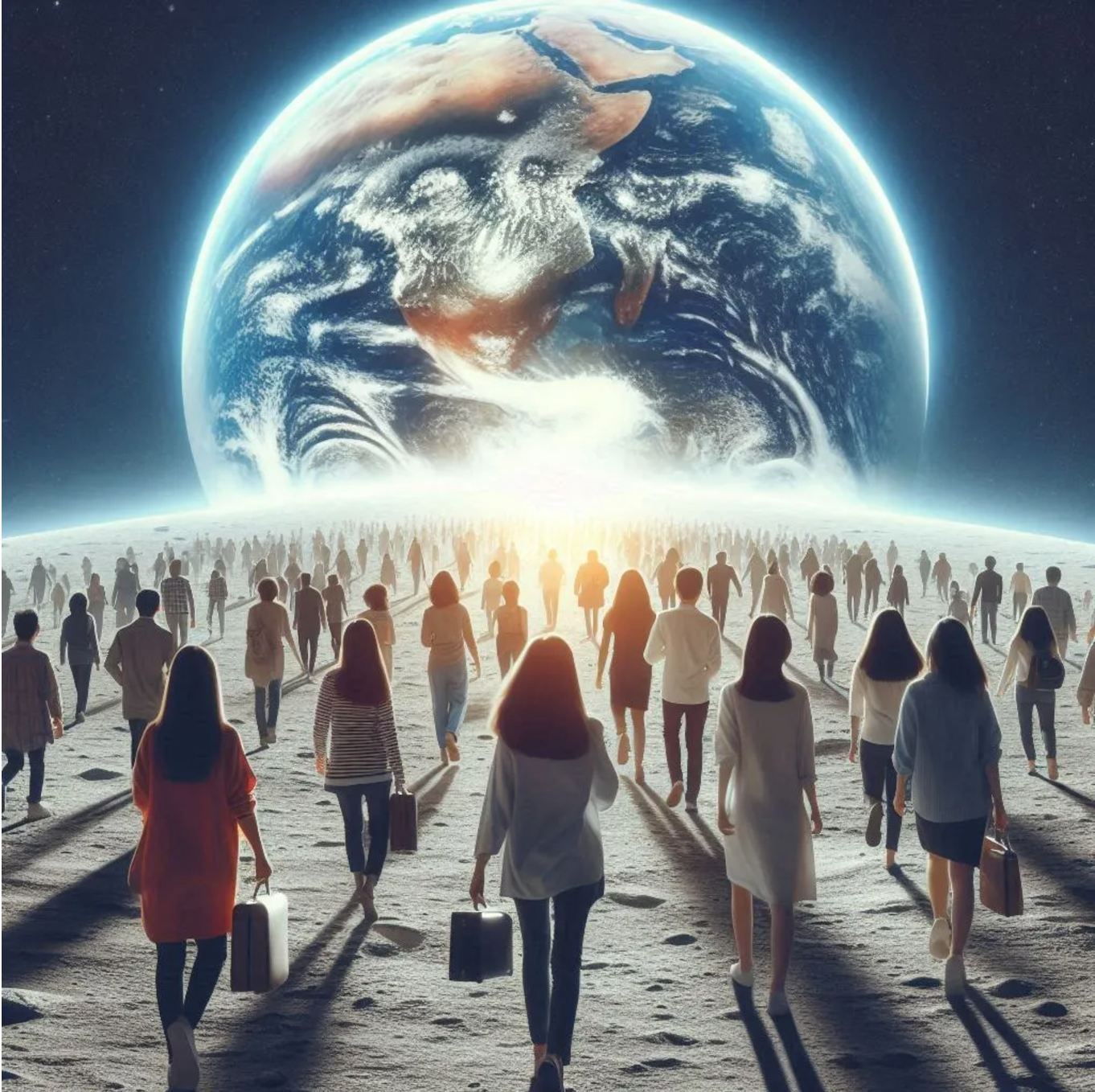Why we are all suffering from man-on-the-moon syndrome
Original Medium Post HERE
This blog is available in five different languages. To select your preferred language, simply click on the yellow button located in the lower right-hand corner of your screen.
And how we can get better
After we’ve all been to the moon, how can we find meaning and excitement back on Earth? Image generated by Microsoft Bing Image Creator
Buzz Aldrin was thirty-nine years old when he walked on the moon.
After returning to Earth, he struggled with alcoholism and depression.
Some wondered: how could the second person ever to walk on the moon be depressed? Why?
Ironically, was having gone to the moon a reason for that depression?[1] After doing something so monumental: stretching the bounds of the possible, what work could seem meaningful back on earth?
— —
— —
Do we have a collective man on the moon problem?
The human race has been to the moon — literally and figuratively. We keep shattering global records for long life expectancy and low infant mortality. The world is the wealthiest it has ever been.
Most of us never will risk being eaten by a tiger, or a shark, unless we choose that risk.
Globally, we consume more calories than we need.
Instead of hunting and gathering our food, our food can come directly to us — pre-made. Rather than washing our clothes and toileting in, and drinking from, an alligator-infested river, we have indoor plumbing, washing machines, dryers, and filtered tap water.
We have more than a billion active smartphones. We consume entertainment on a host of devices.
— —
— —
We are far from having solved it all . . .
Buzz Aldrin returned to a planet where all was not solved.
Fifty-five years later, there continues to be massive suffering. Nearly 700 million people live in extreme poverty, while 3.5 billion “live today on less than $6.85 per day”. Far too many still die of communicable diseases. The planet is heating up faster than expected. The gap between rich and poor has become a chasm in many western nations.
Nevertheless, in many parts of the west, we can easily choose to ignore this suffering. In many communities, big problems might appear solved.
— —
— —
. . . but many of us feel powerless to solve it
Even as many people in developed nations struggle, they can access food, water, medicine and a lot of social media and YouTube.
We were wired to hunt and gather the food, and support the people, we needed to survive. When farms became more efficient, that wiring motivated us to find meaningful work to put food on the table.
We found purpose in the idea of each generation doing better than the last.
— —
In recent years, many have lost the belief that economic progress is possible. Perhaps because we don’t need relationships to hunt, gather, and fend off tigers, we collectively fail to recognize how much we need relationships. We have become less connected.
Many of the remaining big problems feel so big we don’t see our place in fixing them. We feel powerless.
The presidential election provides an apt example. In a nation of hundreds of millions of voters, too many of us (except maybe a few in Pennsylvania) might feel powerless to shape the outcome.
— —
When we sought meaning in our tribe of 150, we found our niche: best hunter, best gatherer, best accessorizing with wooly mammoth bones.
Until mass media culture, we still found our purpose in small communities.
Global (social) media platforms with real time data changed that. We are all on the moon viewing the whole social world at once. Now we know our hunting skills aren’t even the best in the region. Our bespoke wooly mammoth necklaces are not nearly as cool as the neighboring city’s saber tooth bracelets.
— —
— —
Can we make this a healthy cue?
The Apollo 11 astronauts saw a beautiful, awe-inspiring Earth from space. That planet might have seemed more precious, the problems smaller, than they seemed on the ground.
Nevertheless, they returned to a planet with great problems.
Space walking skills were not as helpful for solving those problems on the ground.
Our old skills and beliefs won’t fully equip us to address the new problems ahead. That can leave us confused, scared, or resigned.
Yet there is great reason for hope. We can update our skills and our beliefs. These big problems are not solved yet — and there is a role for each of us to co-create and be part of the solution.
— —
— —
We also can take the ground-eye view.
From the moon-eye view of our media landscape, problems might seem insurmountable. Our place might seem irrelevant.
However when we return to earth, unplug from the media barrage, and head outside, we can find the neighbor next door who needs help shoveling. We can reach out to the aunt who needs a phone call. We can make energy efficiency upgrades to our home.
Those global media systems, global problems, and global solutions don’t exist without individuals: without each of us.
If we each do all we can, maybe, just maybe, it will be enough.
Stay joyful, East Boston.
— —
Please share, subscribe, and join our movement by emailing me or supporting East Boston Social Centers . Look out each week for our posts about boosting joy the only way we can: in community.
— —
[1] I had heard before writing this of a version of “man on the moon” syndrome: the malaise upon returning from something so monumental and not knowing what future work can possibly measure up. In researching this blog, I found more nuance: the adulation on return was difficult to metabolize, Buzz Aldrin had a family history of depression, etc. I kept this example for the metaphor.


